📣 Firmware Update Release:
Firmware Version v0.17 is now released! Please follow the link here or update via Cloudloop Device Manager.
Firmware and Config Update Process
This page covers the process for Firmware and Config updates. The RockBLOCK Pro receives regular firmware updates that contain enhancements and new features, many of which may have added more configuration - therefore we advise checking our User Configuration page and updating the file as required.
Mass Storage Drive (MSD) via USB Type-C
The RockBLOCK Pro will enumerate as a mass storage drive under the name of "RockBLOCK P" once connected to an end device via USB Type-C.
This can currently serve to upload a Firmware or User Configuration file to, and after a reboot (or a power-cycle by removing the USB-C and re-plugging after 10 seconds) the RockBLOCK Pro will find the new file and update to it.
You can drag and drop - or copy and paste the file to the "RockBLOCK P" drive
The files are case-sensitive and will have to match the following naming exactly
- RockBLOCK PRO Firmware =
L4-App.new - RockBLOCK PRO Bootloader =
L4-Boot.newNOTE - Must always be loaded with amanifest.txtfile when updating via the MSD - RockBLOCK PRO manifest =
manifest.txt - User Configuration =
user.cfg - BLE Firmware =
BLE-App.new - Iridium Firmware =
IRID-App.new
It is recommended to use a JSON editor when changing the file as invalid JSON will revert to the default User Configuration file with no error
AT Interface and C-Kermit via Serial
The RockBLOCK Pro allows the update of the Firmware or User Configuration file via Serial over a different individual method
The PRO and Mini products support various different functions via the serial interface (e.g. AT command set, FW update via Kermit and NMEA streaming). Each function should be used independently. Attempting to use 2 or more functions simultaneously can result in unexpected behaviour. For example, NMEA streaming should always be turned off before using AT commands or serial FW update.
User Configuration update over AT Interface
The User Configuration can be read with AT+CFGR and will return a single line JSON payload followed by OK
Example payload:
{"Serial":{"Enabled":true,"mode":"RS232","baud":115200,"parity":"NONE","bits":8,"stop":1},"BLE":{"Enabled":true,"connectionTimeout":300},"GNSS":{"Enabled":true,"nmeaForwardEnabled":false,"reportInterval":0,"apntMode":"STATIC","apntKalmanFilter":"MARITIME","apntSensitivity":"HIGH","apntPowerSaving":"FAST","nmeaSentences":{"GNGGA":false,"GNRMC":false,"GPGGA":false,"GPRMC":false,"GPZDA":false,"PJLTPOS":false,"PJLTSTAT":false,"PJLTSVI":false}},"Sensors":{"Enabled":true},"IO":{"IOtype":"NONE"},"SleepMode":"NONE","LEDS":{"EnablOK":true},"Imt":{"defaultTopic":244,"defaultTTL":600},"BUZZER":{"Enabled":true}
Once edited, it can be updated withAT+CFGW={<SinglelineJSONpayload>} - More Information
You should not have to reboot for the changes to apply via Serial although it is best practice to do so
Firmware Update over Kermit
This Firmware update method requires the use of C-Kermit and the AT interface which is used to set the RockBLOCK Pro in "Kermit Receive" mode
The Firmware file must be named case-sensitive L4-App.new
Windows
Windows
Requires connection to a terminal application that supports Kermit file transfer. Example below uses Teraterm for Windows
-
Serial port settings are
115200,n,8,1 -
Terminal settings are:
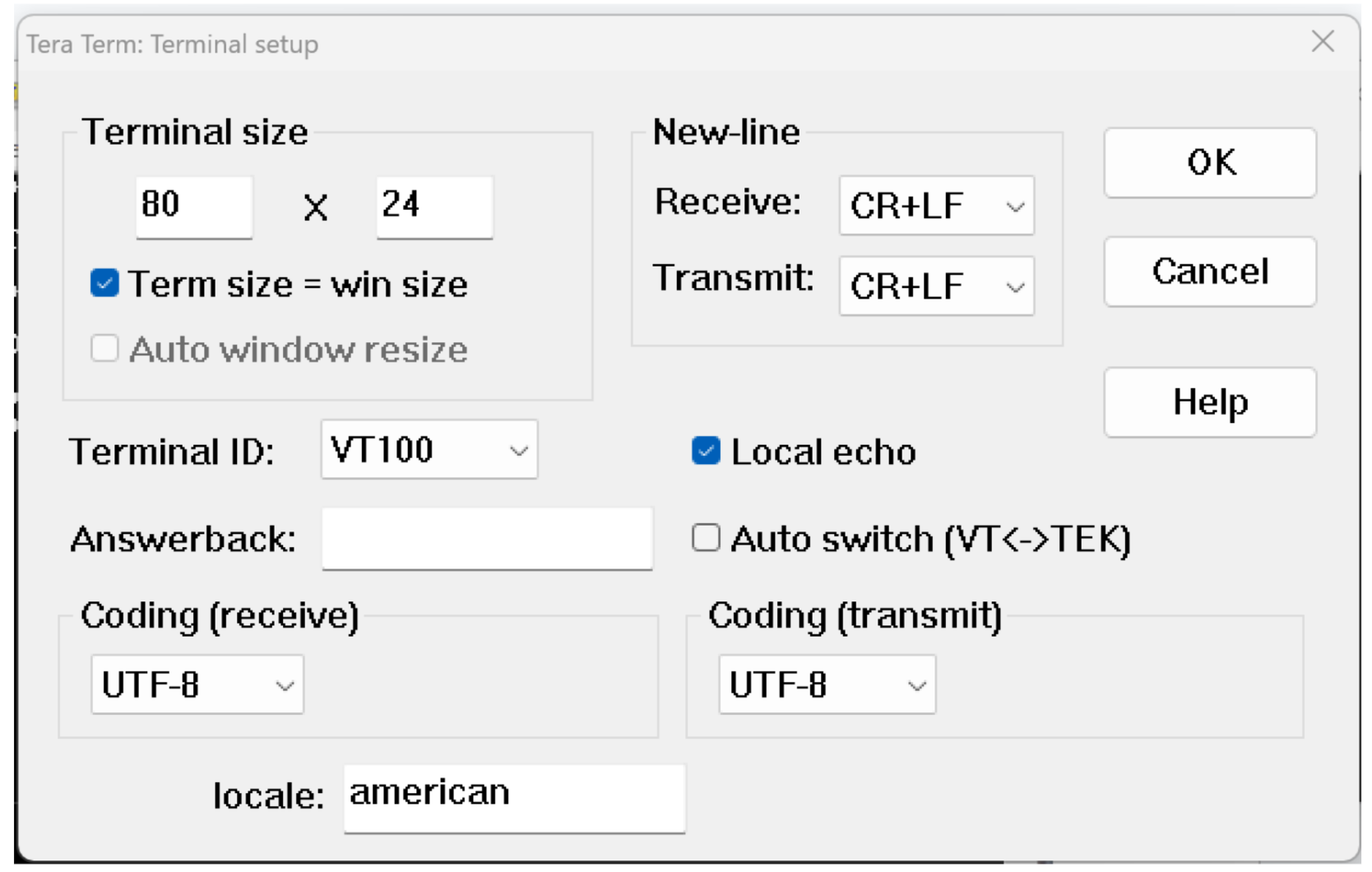
- Put the RockBLOCK Pro in "Kermit Receive" Mode:
Command:
AT+CTOK
Expected response:
+CTOK: <token number>
OK
Note that the token number will only be valid for 30s
Command:
AT+CDFU=<insert token number>
Expected Response:
+CDFU: READY
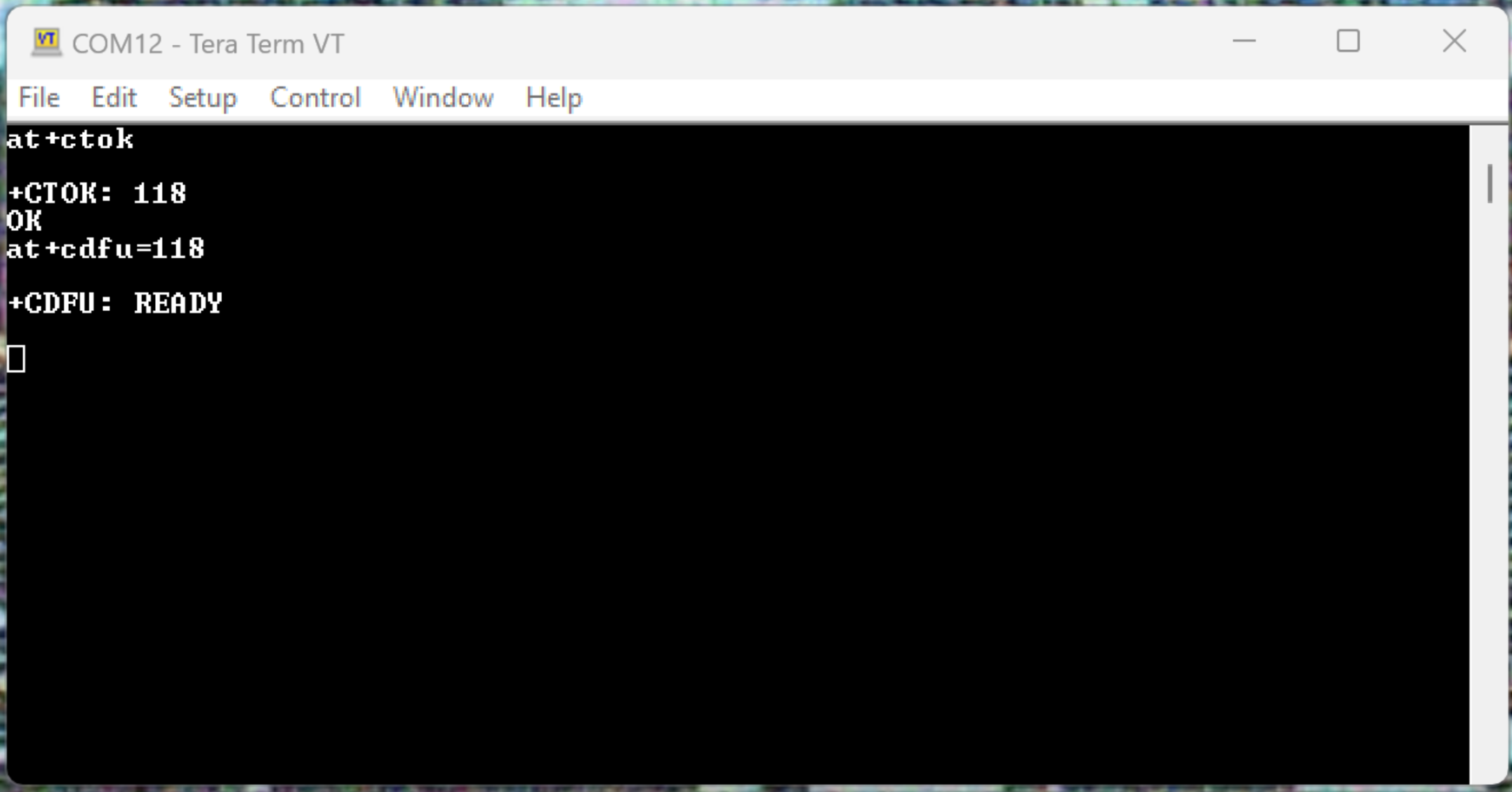
- Click File > Transfer > Kermit > Send ... Select the firmware file in the dialog.
The downloaded firmware file must be renamed 'L4-App.new' (case-sensitive)
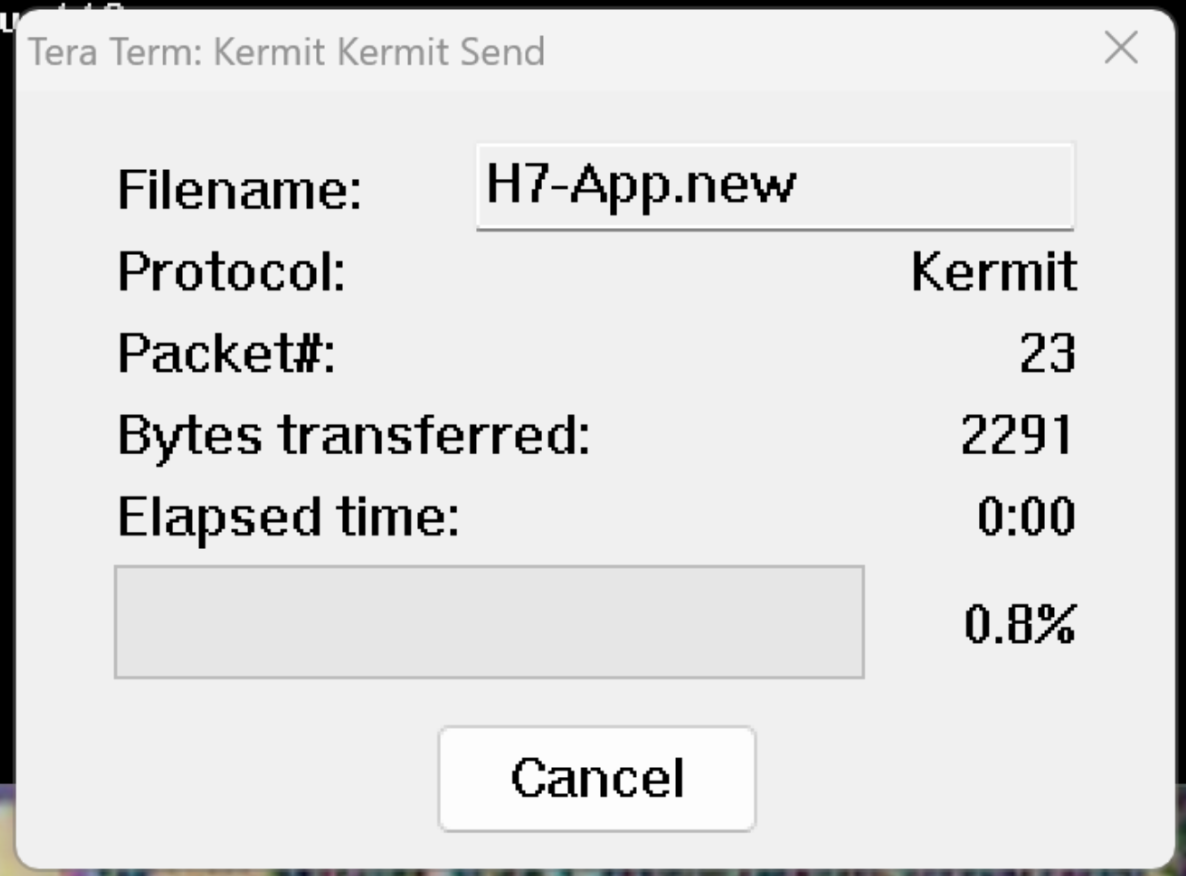
- Progress bar will reach 100% and the dialogue will close.
- The RockBLOCK Pro will automatically reboot on completion.
Linux
Linux
- Save Kermit script to "fw-update.kerm"
#!/usr/bin/kermit +
if < \v(argc) 4 {
echo "Usage: \%0 <serial port> <baudrate> <*.new app file>"
echo "eg. \%0 /dev/ttyUSB0 115200 L4-App.new"
exit 1
}
assign SERIAL_PORT \%1
assign SERIAL_BAUD \%2
assign FILENAME \%3
# Set the communication parameters
set line \m(SERIAL_PORT)
set speed \m(SERIAL_BAUD)
set flow none
set parity none
set stop-bits 1
set carrier-watch off
set file names literal
set window-size 1
set receive packet-length 94
send /AS-NAME:L4-App.new /BINARY \m(FILENAME)
# Uncomment this for stats to be displayed at the end
# statistics /VERBOSE
close
exit
- Put the RockBLOCK Pro in "Kermit Receive" Mode:
Command:
AT+CTOK
Expected response:
+CTOK: <token number>
OK
Note that the token number will only be valid for 30s
Command:
AT+CDFU=<insert token number>
Expected Response:
+CDFU: READY
- Run the script by:
./fw-update.kerm /dev/ttyUSB0 115200 /<filepath>/<Firmware File>
- Progress bar will reach 100% and the dialogue will close.
- The RockBLOCK Pro will automatically reboot on completion.
Replace ttyUSB0 with your correct serial device name (run dmesg | grep tty to find)
Also replace baudrate and other parameters if required
macOS and others
macOS
Older versions of C-Kermit (v9) running on any OS (Including Linux) require a slightly different C-Kermit command
- Put the RockBLOCK Pro in "Kermit Receive" Mode:
Command:
AT+CTOK
Expected response:
+CTOK: <token number>
OK
Note that the token number will only be valid for 30s
Command:
AT+CDFU=<insert token number>
Expected Response:
+CDFU: READY
- Run the C-Kermit command:
kermit -l /dev/tty.usbserial-FT4WLSEC -b 115200 -i -C "set carrier-watch off, set flow none, set parity none, set stop-bits 1, set file names literal, set window-size 1, set receive packet-length 94, send /AS-NAME:L4-App.new /BINARY L4-App-Test-0-0-0.new, close, exit"
- Progress bar will reach 100% and the dialogue will close.
- The RockBLOCK Pro will automatically reboot on completion.
Replace /dev/tty.usbserial-FT4WLSEC with your correct serial device name (run dmesg | grep tty to find)
Also replace baudrate and other parameters if required
Also replace L4-App-Test-0-0-0.new with the correct filename
Over the Air via Cloudloop Device Manager
Cloudloop Device Manager (CDM) allows remote management and troubleshooting of devices and uses Iridium Messaging Transport (IMT)
Any use of Cloudloop Device Manager will result in data usage
User Configuration update over IMT and CDM
Optimising for lowest possible satellite data usage, the user configuration file is split by sections in CDM.
Each section can be individually requested, and updated.
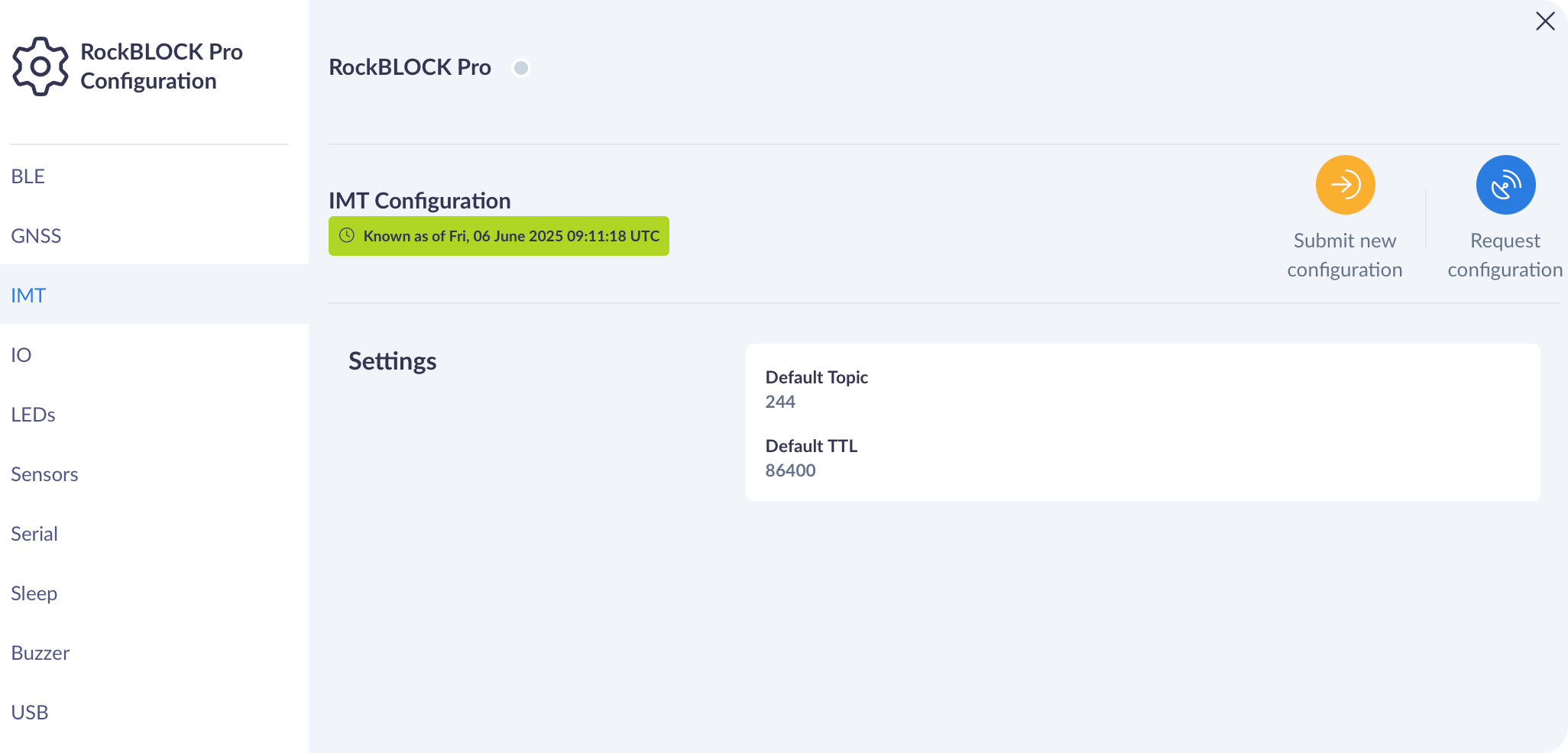
Firmware update over IMT and CDM
CDM allows the upgrade and downgrade of Firmware with the option to check the current version, see the release notes of new versions and the estimated size of the new version.
Note that from v0.17 each FW update is likely to also require an update to the Bootloader. The Bootloader MUST be downloaded
to the unit BEFORE the FW update, therefore when the FW update is requested from CDM it will begin by transferring the Bootloader,
this will trigger a re-boot once complete, after this re-boot the remaining files including the new FW will be transferred,
resulting in a final re-boot when all files will be installed simultaneously.
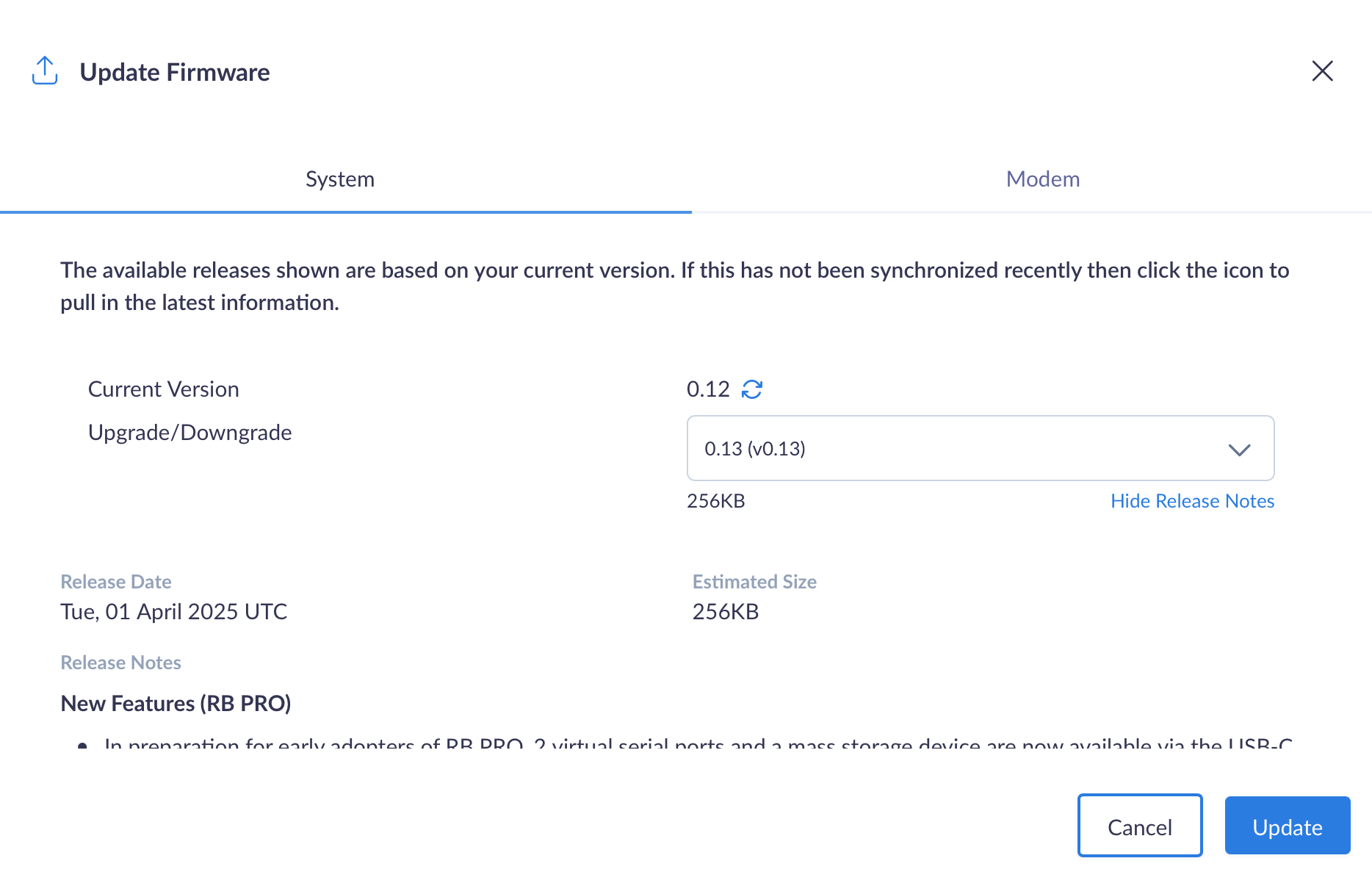
User Configuration via Bluetooth App
The RockBLOCK Pro can be configured and managed via the all new RockCONNECT IoT (From FW v0.15)
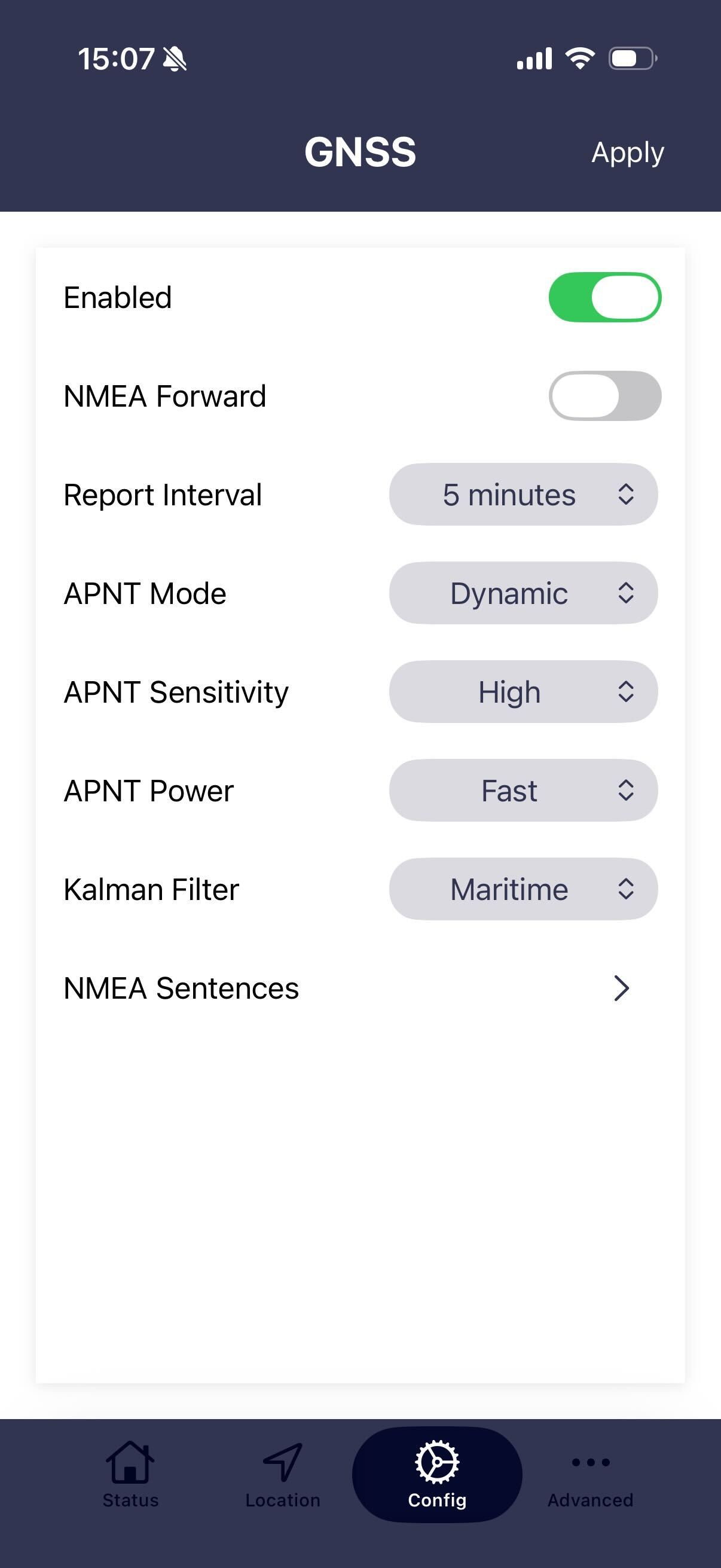
If your device was released prior to the RockCONNECT IoT App being released then you would have to follow the local
firmware update process to update the Bluetooth Firmware in the same manner, making sure that the file is named "BLE-App.new" - file can be downloaded below
Downloads & Release Notes
Ensure that both user.cfg and user.fac are PUT onto the Pro or OEM unit. As covered in the instructions above. These files can be downloaded using the links below.
Example User Config File
Example User Factory File
The purpose of the .fac file is to provide a reset to factory default path. If a factory reset takes place, this file will replace the user.cfg file within the product.
v0.17
See drop down below for previous releases.
Download PRO(L4) FW Version 0.17 - LATEST
Download PRO(L4) Bootloader Version 0.17 - LATEST
Download manifest for Bootloader update over MSD
Download BLE Version 0.14 - LATEST
Android RockCONNECT IoT App
iOS RockCONNECT IoT App
If updating from versions prior to v0.15 you will need to update to v0.15 FIRST
In order to use ALL Cloudloop features and benefit from performance improvements all users....
Please be aware Fundamental changes have been made to the device configuration structure.
In order to avoid potential issues it is IMPORTANT that the BOOTLOADER, user.fac and FIRMWARE are updated in that order.
New Features:
- Ability to upgrade the Bootloader Firmware locally via Kermit, TFTP and USB-C.
- Ability to upgrade the Bootloader Firmware remotely via Cloudloop using CDM.(CDM will guide you through the 3 stage process required for 17.1)
- Option to select and stream individual GNSS sentences via NMEA now available in user configuration. (NOTE: After upgrade users will now need to update the config to continue NMEA streaming)
- BLE idle disconnection timeout is now configurable
- Reset cause is now reported on Stats page and in-App by both Application and Bootloader
- Position reporting intervals now align to the 'clock'. e.g. every 10mins will be 1200, 1210, 1220 etc.
New Features - RockBLOCK Pro APNT:
- Option to select and stream individual APNT sentences via NMEA now available in user configuration.
- APNT units report both their APNT and GNSS positions in CDM/CL Tracking simultaneously as default.
- New AT+APNT command working on the same principle as AT+GNSS
- New AT commands and USB-C update process for loading and managing APNT License Key (AT+APNTGS, AT+APNTWK and AT+APNTUK)
Bug Fixes:
- Resolved: Rare occurances internal flash file corruption which resulted in firmware or config changes not having effect. SEE NOTE BELOW
- Resolved interruption to MO messaging which resulted in a stalled queue
- Resolved SNTP bugs
- Resolved NMEA forwarding bugs
- Resolved Bootloader bugs - Bootloader update required.
- Resolved instability occurring after a soft-reboot either user or application triggered
- Resolved invalid GNSS COG value
- Resolved Location Reports bugs
- All sections of the User Configuration file can now be updated dynamically without requiring a reboot
Known Bugs:
- If the position report interval is changed, the setting will only take effect after the next report at the previously set interval. Rebooting will allow the change to take effect immediately.
In order to minimise the risk of corruption during firmware updates or downgrades it is strongly advised to follow the following cautions:-
- When using Kermit to update via serial ALWAYS use a baud rate of 57600 or less.
- While the update file transfer is taking place (Applies to all upgrade methods including CDM):
- Turn off position reporting.
- Turn off the NMEA stream.
- Avoid sending MO's.
- Avoid making configuration changes either by file update or using the BLE app.
View previous Release Notes
v0.15
Download FW Version 0.15
Android RockCONNECT IoT App
New Features:
- Improved message handling and prioritisation. New options have been added to the command AT+IMTWB/U to indicate MO message Priority and/or TTL on a message-by-message basis
- Ability to retrieve a System and Service log file from Cloudloop Device Manager, including details such as first position fix, modem connection, PPP connection, signal logging, high temperature logging, and Iridium 97XX error codes
- Bluetooth support added (requires a Bluetooth firmware update using a
BLE-App.newfile) enabling communication via the Bluetooth application
Bug Fixes:
- Resolved issue causing RR-Mini to lock up when MO messages were sent rapidly under poor sky visibility
- Fixed an issue where Mass Storage and virtual serial ports did not always enumerate correctly on Raspberry Pi OS
- Soft-reboot no longer occurs when NMEA forwarding is first enabled through serial (AT+CFGW)
- Fixed bug where using the Sleep pin to put RockBLOCK PRO into sleep mode would not bring the device back up on release
- Resolved Cloudloop Device Manager errors on RockREMOTE Mini when configuring firewall rules with a default configuration
- Fixed issue where a soft reboot could leave the device in an unusable state until a hard reset (Including after Iridium update)
RockBLOCK Pro APNT:
- Full product support in Cloudloop Device Manager and BLE App
- Ability to configure the Kalman filter settings
- Ability to configure APNT Mode, Sensitivity and Power settings
- Ability to configure a Position Source (GNSS/APNT)
- Full view of APNT parameters in the Virtual Statistics over Type-C v0.13
New Features:
- RockBLOCK PRO is now supported in Cloudloop Device Manager, including configuration and firmware updates over-the-air
- RockBLOCK PRO enumerates a second virtual serial port over USB-C, enabling AT command support
- RockBLOCK PRO STL module support is now enabled (Set up in production and disables the use of internal GNSS)
- Tracking position reports can now be sent at configurable intervals to Cloudloop Device Manager and Cloudloop Tracking (Messages include Time, Latitude, Longitude, Altitude, COG and SOG)
- User-configurable NMEA forwarding from the GNSS (or STL) module via the serial interface
- Message queuing system revised to significantly increase MO and MT storage capacity and allow concurrent processing (Increasing absolute stored message count from ~500 to ~6000 and increasing the total capacity from ~1.8Mb to ~3Mb)
- Cloudloop Device Manager MT File transfers are now revised and significantly improved
Bug Fixes:
- Fixed mismatch between
+IMTMTRINGand+IMTMTSMTMessageID - SMTP email formatting corrected by removing name fields and trimming angle brackets ("< >")
- Altitude values >9000m now correctly handled (previously returned
Invalid Position) - Resolved deaf timer triggering when 0 topics are provisioned but data services are active
RS4XX_FULLnow correctly persists in configuration and no longer reverts toRS232after reboot- Requesting all configuration segments from Cloudloop Device Manager no longer triggers an unexpected reboot
- Firmware update over Cloudloop Device Manager is now fully functional
- Zero-length CDM MT messages no longer cause a malloc failure
- IMT MT message handling improved and fixed – multiple back-to-back messages can now be processed reliably
Known Bugs:
- Enabling NMEA forwarding via serial (
AT+CFGW) may cause a soft reboot. - Updating the Iridium modem firmware over Serial may require a manual reboot.
- On the RockBLOCK Pro - Physical Sleep Pin is not yet implemented.
- On the RockBLOCK Pro - Mass Storage and virtual serial ports may not enumerate properly in low current USB ports and may require an additional power supply using the Power, Serial and GPIO cable (Seen on Raspberry Pi 4).
RockBLOCK Pro STL only:
-
Kalman filter on STL module is hard set to
Marineand power saving toOFF(BETA) v0.12.28
Connectivity & Interfaces
- Communicates via Iridium Satellite using IMT (Message Transport) protocol with support for ASCII (text), binary and JSON payloads.
- USB-C interface supports dual virtual serial ports and mass storage enumeration.
- 1 Virtual Serial Port showing Status and Statistics
- 1 Virtual Serial Port enabling AT+CMD
- Sleep pin functionality on Power, Serial and GPIO Cable.
Messaging & Data Handling
- Stores messages and dynamically balances MO and MT queues.
- Full support for MO/MT message history, clear/cancel operations, and status queries via AT commands.
- Cloudloop Device Manager (CDM) allows remote configuration, firmware upgrades, location reports and more.
- Configurable tracking reports sent at defined intervals containing GNSS position.
- Message delivery reliability watchdogs and re-queueing logic to avoid loss during transmission.
Configuration & Management
- All device configuration can be updated remotely over-the-air (OTA) via Cloudloop Device Manager.
- Full Cloudloop Device Manager integration for remote command, reboot, and configuration inspection.
- Virtual Serial Port exposing status and statistics via Type-C.
- Supports firmware updates via Cloudloop Device Manager OTA (from Iridium network), Mass Storage (USB Type-C), and Serial (Kermit protocol).
GNSS & Positioning
- Supports GNSS positioning with user-configurable NMEA sentence forwarding via serial.
- AT command available to report or manually inject GNSS coordinates.
AT Command Interface
Complete AT command set for:
- Message queue management
- Modem and MCU diagnostics
- GNSS reporting
- Configuration control
Reliability & Stability
- Built-in watchdog resets MCU after lockup (4s timeout).
- Iridium modem auto-restart logic during provisioning or signal failure (2m timeout).
Hardware Support & Expansion
- Supports RS232,RS422/RS485 (full duplex) serial modes.
Known Bugs:
- When a series of IMT MT messages are sent in quick succession in some cases one or more messages may be lost/dropped - this behaviour has mainly been seen/replicated when requesting all sections from the Config from CDM.
- MO Queue can stall in low signal environments and cause a reboot.
- RS4XX_FULL reports as RS232 in User Configuration and may default to RS232 after a reboot.
- Firmware update over CDM might not be possible due to dropped MTs. Local firmware update unaffected. We are working with Iridium to resolve this problem.
- Soft-reboot can occur when NMEA forwarding is first enabled through serial (AT+CFGW).
- Updating the Iridium Modem Firmware over Serial can cause a Bootloader Cycle requiring a manual reboot.
- Mass Storage and virtual serial ports may not enumerate properly on Raspberry Pi OS.
- Physical Sleep Pin not yet implemented.
- SBD Emulation currently incomplete.
Recommendations:
- Physical Serial Configuration: RS232, 115200, 8 data bits, no parity, no flow control
- Local Firmware and Configuration update either via Mass Storage (USB Type-C) or Serial (Kermit)
- Sending MT at intervals longer than 15s apart
Iridium Modem Firmware
The process to update the Iridium 9704 modem firmware locally is similar to the updating the product firmware.
If this update is required further instructions will be provided by the Ground Control team.